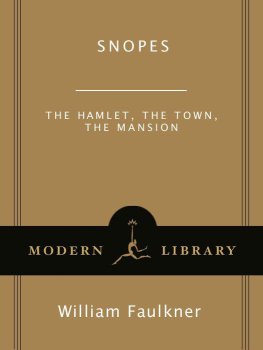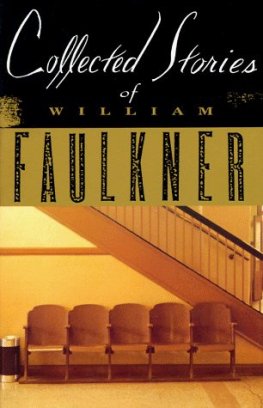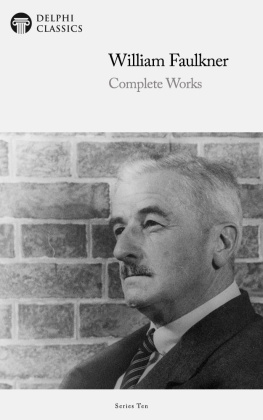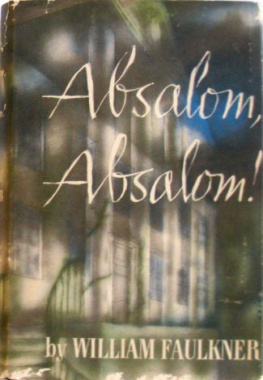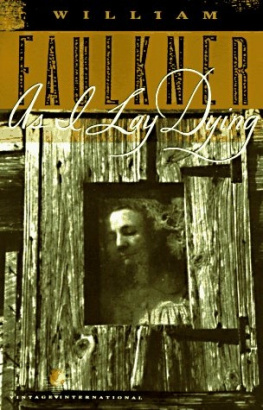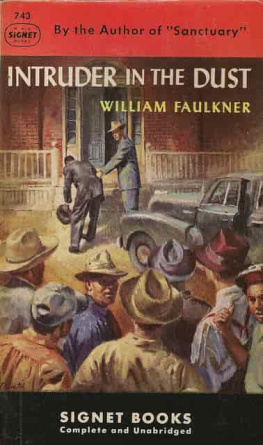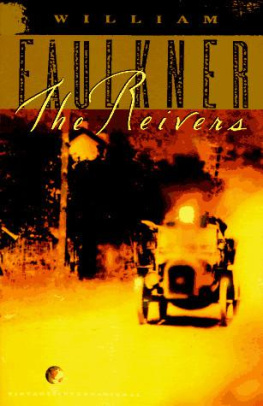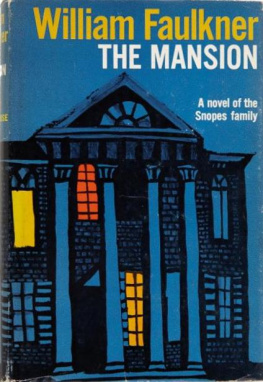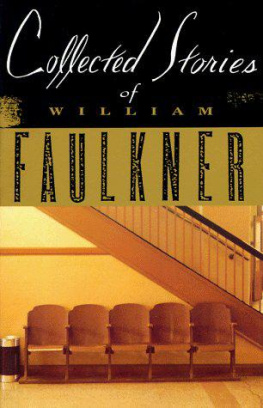



Copyright 2007 by Princeton University Press
Published by Princeton University Press, 41 William Street, Princeton,
New Jersey 08540
In the United Kingdom: Princeton University Press, 3 Market Place,
Woodstock, Oxfordshire OX20 1SY
All Rights Reserved
Library of Congress Cataloging-in-Publication Data
Godden, Richard, 1946
William Faulkner : an economy of complex words / Richard Godden.
p. cm.
Includes bibliographical references and index.
eISBN: 978-1-40082-791-6
LC Control No.: 2006050964
British Library Cataloging-in-Publication Data is available
This book has been composed in Helvetica Neue Typefaces
Printed on acid-free paper.
press.princeton.edu
Printed in the United States of America
10 9 8 7 6 5 4 3 2 1
To John T. Matthews and Noel Polk
FOR THEIR WORK AND FRIENDSHIP

CHAPTER ONE
CHAPTER TWO
CHAPTER THREE
CHAPTER FOUR
CHAPTER FIVE
CHAPTER SIX
CHAPTER SEVEN

JOHN T. MATTHEWS, on noting a conference member slump abruptly forward during a paper of mine, once observed that my prose style had finally killed someone. Noel Polk, as a long-time and generous reader of my drafts, worked tirelessly to reduce fatalities. Over the years, both have spotted gaps in my assumptions about Faulkner and suggested means to correction. They, to whom I dedicated the book, are part of a network of Faulknerians whose writing informs the work: I think particularly of Anne Goodwyn Jones, whose delighted skepticism regularly persuades me to reconsider; Peter Nicolaisen, whose clarity I can hope only at some point to emulate; Richard Gray, whose knowledge of southern writing serves as benchmark and rebuke. To write on the South from the perspective of a historical materialist, I have needed southern historians, and have been lucky both at Keele and at Sussex to fall among them: Mary Ellison and Martin Crawford (from Keele) and Trevor Burnard, Richard Follett, and Clive Webb (from Sussex) have been graceful yet direct in countering my ignorance.
Peter Nicholls has little time for the South or for Faulkner, but his eye for the pleasures and strategies of modernist opacity grounds much of what follows. Charles Swann had no time for Faulkner, but remained a friend who regularly and with wit delivered the knee-capping questions necessary to those who would write on that about which much has already been writtensince without an enforced shift of perspective, why bother? Colin Richmond, in his insistent curiosity, stands as a distant intellectual example. Rhian Hughes, Tomos Hughes, and Mabli Godden have lived with the work for as long as I have, but with the illuminating conviction that other (sometimes minor) things matter much more; and in mattering so much, must, in the last instance, be brought back to inform the work. I thank them for putting so much into it.
Bits and pieces of what follows were critically read or usefully remarked on by Susan Donaldson, Richard King, Andrew Lawson, Tim Lustig, Sharon Monteith, and Patsy Yaeger. The fifth chapter would not have been possible without an earlier and jointly written essay: for permission to use some of that material in a slightly reinflected form, I again thank Noel Polk. All the above mentioned are in some degree responsible for what follows; I hope that the book does not shame their responsibility.
Research leaves from the Universities of Keele and Sussex and an award from the AHRC have abbreviated what at times felt like an interminable project. Chapters or parts of chapters have appeared in different forms in ELH, The FaulknerJournal, and the Mississippi Quarterly. I am grateful to those journals for permission to reprint that work here.


MY TITLE intends no metaphor in its linking of language and economy. Words, as social instruments, exemplifying what Marx calls practical consciousness, by prior and unknown users and usage. Since verbal instrumentalists work with a partially known instrument, and in circumstances not of their own design, they, to adapt Marx, are practically unconscious concerning large portions of their practice. Yet that practice, so much incomplete matter made from words, materializes within an economy whose historical conditions form, and take formal complexity from, linguistic work. Five sentences built upon begged questions, compound assumptions, and parabolic bids which it will take an entire study partially to answer, justify, and elucidate. But introductions may perhaps take liberties and should not give the game away.
In a recent anthology of new economic criticism, the editors, Woodmansee and Osteen, note that many who address the intersection of literature and economy argue from analogy: words have their economiesor so the case goesbecause language and economy are both arbitrary systems of exchange: Thus any adequate theoretics of literary economics must begin with the axioms of Saussurian linguistics and post-structuralist theory, that all signs are arbitrary and related syn-tagmaticallyand then address the similarly fictive and constructured nature of money and finance. that social relations are finally a cause of what stories can and cannot be told (and of the manner of their telling); and that, therefore, economic structures may be read as the generative source of fictional forms. Since I seek to establish a causal rather than arbitrary connection between the work of Faulkners words and the work of an economy, I had best gloss the economy in question.
Between 1933 and 1938, the New Deal interventions of the Agricultural Adjustment Program in the southern plantation states resulted in an unintended revolution in rural labor relations. Faced with a glutted world market for cotton, the federal government offered to pay southern landowners for ploughing their crops under. Fifty-three percent of the souths cotton acreage went out of production. Since a sharecropper, cropping on a half-the-crop agreement, would by rights receive half the federal payment for the sacrifice of his acres, it paid for the landowner not to sign sharecropping contracts for the following year. Instead, he might hire the same cropper, on an occasional basis and for a wage, to plough the crop under, and reap the entire subsidy himself. Between 1930 and 1940, the tenantry declined by 62 percent in Mississippi. What the labor historian Pete Daniel terms the Southern enclosure marks the movement from capital-scarce, labor-intensive plantation production to capital-intensive, labor-surplus neo-plantation production, 5 a structural shift most manifest in eviction and black diaspora.
Next page

